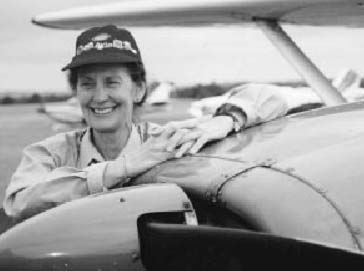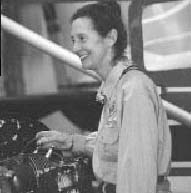|
How Marion McCall gave the devil the slip On a Wing and a Prayer by Roland Ashby ``What are you going to do now you're in your late forties and your last child is about to leave home?'' a friend asked Marion McCall six years ago. For some time she had wondered how she could help her husband, Bishop David McCall, whose Diocese of Willochra in South Australia stretches over an area six times the size of England. ``Spending so much time driving thousands of miles was just killing him.''
She recalls
her first lessons: ``Taking off was easy, but landing was a problem. When the wheels
are about 3 feet, 6 inches from the ground you're supposed to take the plane down
very gently. But even with three cushions on a seat clearly designed for men I had
difficulty seeing well enough to estimate the distance from the landing strip!''
After a week of failed attempts at landing, Mrs McCall decided she had had enough.``It was more than just not being able to master the basics. I really thought I was going to kill myself each time I tried to land,'' she recalls. ``For the first time in my life I was facing up to real fear---the kind which starts in the pit of the stomach and moves up to the brain. Fear became a real presence.'' Fear, she says, is the name she gives to the devil. ``It's fear which stops us doing anything. It's fear which stops us reaching our true potential.'' A friend gave her a book on alcoholism, where she read: ``When you notice...tensions (growing) into nearpanic, and old fears returning, this is the time to stop short and turn to God.You can do nothing anyway, and you will find that if you supply the willingness He will supply the power.'' This was the turning point. ``I said to God,`I'm willing but you'll need to provide the strength.' I decided to take God with me.'' At first she wasn't disappointed. ``My next landing was beautiful, for which I said out loud, `Thank you, Lord.' I explained to my somewhat bemused flight instructor, Des O'Driscoll, that bishops' wives were given to saying that sort of thing. ``However, my jubilation was to be short-lived.The next landing was terrible, overshooting the runway into some rough ground where we bumped along and thudded to a halt. ``Turning to me, Des drily remarked in his broad Australian, `He's gawn and left yah!'''
There were to be other mishaps. ``Part of the training involves teaching survival skills in the event of engine failure. After climbing to 3,500 feet, you switch off the engine, and then follow the procedure as outlined in the manual: 1) reassure your passengers that you know what to do in the situation; 2) choose a paddock; and 3) glide down into the paddock,'' she says in mock seriousness at the suggestion that all this is to be achieved simply and serenely. On one such occasion, she continues,``we had descended to just 20 feet off the ground when Des said, `Take her home, the ground's too wet. But I tell you what, you've upset that woman hanging out her washing.''' When the big day came to go solo, ``I said to God, `Zip! We're on!''' Flying solo, she reflects, ``is a bit like having a baby. Anybody can get a plane airborne, but it needs every ounce of strength to land it.'' Now an experienced pilot, her request during the Lambeth Conference was for a course in basic aircraft repair to avoid getting stranded in her remote destinations. Mrs McCall has found herself in many embarrassing situations.``After a meeting of the bishops' wives, I agreed to take them up. Screaming down the runway I realised we weren't going to get airborne. ``Because I hadn't wished to offend, I'd allowed the largest ladies to sit in the back. So we had to stop and change places.Although this time they were in the front, to make matters worse I had to ask them to lean forward.'' When she's lost, she likes to sing hymns. ``On one occasion, after singing through my repertoire several times--including old favourites `Abide With Me' and `Nearer My God to Thee'--Des's voice came over the radio:`Don't you know any other hymns?' I'd left my radio microphone on!'' Another time, Archbishop David Hope, of York, who recently visited South Australia, asked to see the diocese from the air. Not only did the radio fail at one point in the flight, but shortly after leaving the Cooper Pedy airstrip, 50 feet from the ground, there was an engine malfunction. Thinking she had managed to conceal this from the Archbishop, a message later came over the radio, ``Hope your radio's working better than the engine.'' Mrs McCall also recounts the time in 1994 when she and her husband faced real danger.``We suddenly found ourselves in the middle of a severe storm and thick cloud. Cloud is particularly dangerous because you lose the horizon and become disoriented.'' She attributes their survival to a special course in flying in dangerous conditions, which had been designed as a result of the deaths of four women who flew into bad weather. In her own book of poetry, ``Out of Willochra,'' she pays tribute to the women in ``Last Night:''
To fly, she believes, is also to ``leave the earth and enter a new dimension.'' She says she now understands the heroine pilot in ``Out of Africa'' who says, ``In the air you're taken into the full freedom of the three dimensions. After the long ages of exile and dreams, the homesick heart throws itself into the arms of space, the laws of gravitation and time.'' But it is perhaps this favourite quotation from philosopher Guillame Apollinaire which comes closest to expressing her profound joy in flying:
|

 When
Mrs McCall announced at an archdeacon's party that she had been thinking about learning
to fly but did not have the money, someone suggested that she ask the people of the
diocese to buy $10 shares in her. But first she had to give the ``enterprise'' a
name. ``Marion Over Willochra (MOW) was rejected in favour of Wings Over Willochra
(WOW),'' she says. It's ``just extraordinary'' how the money poured in, Mrs McCall
adds. ``Before long thousands of dollars had been raised. It was getting serious---I'd
really have to fly!''
When
Mrs McCall announced at an archdeacon's party that she had been thinking about learning
to fly but did not have the money, someone suggested that she ask the people of the
diocese to buy $10 shares in her. But first she had to give the ``enterprise'' a
name. ``Marion Over Willochra (MOW) was rejected in favour of Wings Over Willochra
(WOW),'' she says. It's ``just extraordinary'' how the money poured in, Mrs McCall
adds. ``Before long thousands of dollars had been raised. It was getting serious---I'd
really have to fly!''